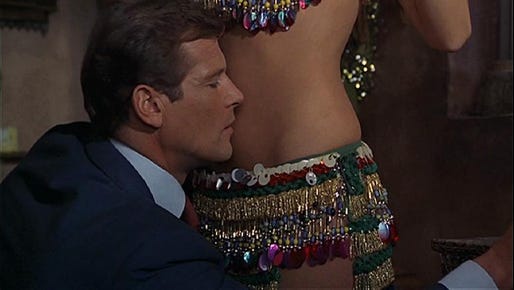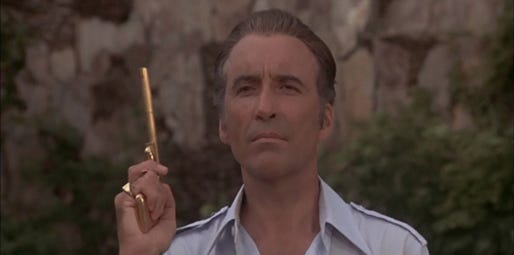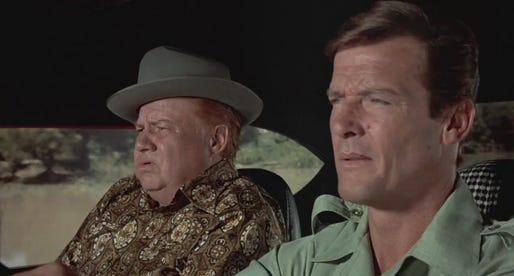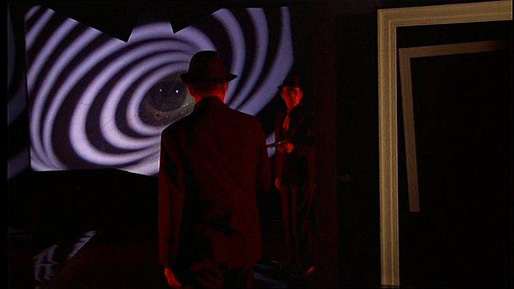You Only Live Twenty-Thrice: "The Man with the Golden Gun"
“You Only Live Twenty-Thrice” is a look back at the James Bond films.
Each Friday until the release of the 23rd official Bond film, “Skyfall,” we will revisit its 22 official predecessors from start to finish, with a bonus post for the unofficial films in which James Bond also appears.
Momentarily set aside James Bond’s surfeit of gadgets. Briefly forget sexual prowess substantial enough to find G-spots and ways to reverse evil women’s amorality. Temporarily lose sight of how awesome Commander Bond always looks in a suit.
Stunts, suavity, style and sexuality compose 95 percent of what defines 007, and each is an irrevocable element of five decades of entertainment. Far more intriguing, though, is that elusive, fleeting glimpse at the other five percent — the percentage that’s more like you and me.
Who hasn’t been convinced he has the upper hand, as Bond did against SPECTRE in “From Russia with Love,” only to learn he was being played? Who hasn’t known the ecstasy of love and the grief of death as 007 does in “On Her Majesty’s Secret Service”? In low moments of fury, who hasn’t dreamt of vengeance a la “Licence to Kill”? Who hasn’t felt betrayed by a longtime ally as in “GoldenEye”? And 2006’s “Casino Royale” is almost entirely built on the brusque impulsiveness to which we all occasionally fall prey.
Every actor to play Bond in an official film got this chance at ephemeral emotions or raw, guard-down vulnerability … except the one who played him the longest.
Roger Moore wasn’t incapable of a harder edge; he earned acclaim for “The Man Who Haunted Himself,” his last film role before becoming Bond, as a man who briefly dies and is resurrected only to fear he’s going insane. And out of all of Moore’s films, 1974’s “The Man with the Golden Gun” comes the closest to letting that edge peek through.
When MI6 is sent a golden bullet with “007” embossed on it, they know it’s the work of Francisco Scaramanga (a terrific Christopher Lee) — a KGB-trained assassin who charges $1 million per hit, needs only one shot from his golden gun and has stopped the heart of every opponent who’s seen his face.
It would seem the egotistical Scaramanga is working his way up the list of superstar agents — having gunned down 002 in Beirut. But Bond’s investigation leads him to Andrea Anders (Maud Adams), Scaramanga’s mistress, and it’s revealed that she sent him the bullet. Why? As a plea to draw Bond out and enlist his skills as a triggerman, confident 007 is the only one who can kill a vile villain who nonchalantly waves his golden gun near her mouth.
In exchange, Anders agrees to deliver the Solex Agitator — a solar-powered energy source that could resolve the world’s oil crisis but has fallen into Scaramanga’s hands. After a night of passion, Bond meets Anders for the drop at a Muay Thai match in Bangkok, only to find her dead and Scaramanga sidled up next to him.
From the moment we meet this menace — easily the finest fully featured foe since Donald Pleasance’s Blofeld in “You Only Live Twice” — there’s no doubt that Bond will best him. But what if the Solex Agitator weren’t in the picture? What if Bond simply decided Scaramanga had to go down for his crimes, namely murdering Anders — Bond on a mission of moral outrage instead of global salvation?
In a dinner scene between Bond and Scaramanga, “Gun” offers unexpectedly meaty contemplation on the mindset of murder; if you kill with an honorable code, Scaramanga rightly asserts, you still kill. It’s a briefly flickering idea that Scaramanga and Bond are funhouse-mirror reflections of one another — an appropriate metaphor given the circus-born Scaramanga’s penchant for theatricality and one said to have been more deeply infused into much earlier drafts of the script.
However, a righteousness born of guilt and anger is not what sends Bond on a solo mission to Scaramanga’s remote lair. It’s retrieval of that coveted Solex Agitator — “Gun’s” attempt to tie into the 1973-74 oil crisis, an international incident that kept oil prices high until Moore permanently holstered his Walther PPK.
Well, it’s the Solex and the ill-advised inclination to save a different Bond girl — fellow MI6 agent Mary Goodnight (Britt Ekland), who apparently had any shred of self-esteem removed before her extensive training in the deadly arts of cowering, pouting, bikini waxing and generally screwing up everything.
The incredible inanity of the all-time worst lead Bond girl is just one indication of the cartoonish tone that always won out in Moore’s Bond films, just as it does here. (That Bond doesn’t sleep with anyone until more than an hour in passes for moderation.) Then again, just 12 years old itself, perhaps the Bond franchise decided to embrace the comic interests of its junior-high-aged mindset.
It starts with a sluggish opening-credits sequence that puts the tit in titles, with one buxom woman grinding in front of fireworks and lily-pad nipple covers on another.
That’s the backdrop to one of the most badly bungled Bond themes — this one from Scottish singer Lulu, which clumsily shares its refrain with the movie’s title. The pedal on the fuzzed-out guitar seems set not to “overdrive” but “overcompensate.” Its lyrics are neither clever (“Who will he bang? / We shall see / Oh, yeah!”) nor mysterious (“He has a powerful weapon / He charges a million a shot / An assassin that’s second to none / The man with the golden gun!”). And, as you’ll hear, Lulu’s transformation of “gun” into a two-syllable word gets old fast.
There’s much more. Bond nibbles a bejeweled bullet from a bellydancer’s navel before swallowing it in a fight and letting it "naturally pass." He meets a naked Thai swimmer named Chew Mee. (She’ll be here all week, folks.) Sheriff J.W. Pepper (Clifton James), the chaw-chewing, big-gutted Louisiana sheriff whose bayou Bond wrecked in “Live and Let Die,” makes an unnecessary, and unwelcome, return.
Before twisting the knot on a sumo wrestler’s mawashi belt to rack his nuts, Bond claws his fingers into the wrestler’s butt cheeks. The movie isn’t even really trying when cutting from the line “Bottoms up” to a wriggling rump. And Scaramanga’s “superfluous papilla,” or third nipple, has a larger role than some speaking actors.
So, why did a tale that could’ve been a bit ragged — and a nice stretch for an actor known for playing raffish rogues — become simply a so-so romp? Chalk it up to a nervous need to capitalize on other genres’ zeitgeist. (Despite what works about both “Die” and “Gun,” Moore wouldn’t get to just do a damn-good, straight-up Bond film until “The Spy Who Loved Me.”) Much as “Die” capitalized on blaxploitation tropes, “Gun” base-jumps Bond onto the bandwagon of martial-arts films.
The only black belt Moore holds is in punches that take two seconds to land, so he would appear uproariously overmatched against those who are fleet of fist and foot. That’s why, in the movie’s centerpiece karate scene, he barely raises a hand.
And before that, screenwriters Richard Maibaum and Tom Mankiewicz deliver one of the series’ most welcome laughs to date and a precursor to the sword gag in “Raiders of the Lost Ark.” (Also notice that Bond is, well, a gigantic asshole to the Short Round-esque urchin whom he promises a fortune in exchange for help.)
What isn’t so amusing about “Gun” is Pepper’s presence. Why an unrepentantly racist redneck would enjoy a vacation to Southeast Asia is never explained, and it’s as if Joe Pesci’s Leo Getz from the “Lethal Weapon” series wandered into a “Mission: Impossible” movie.
Pepper briefly sits shotgun as Bond pursues Scaramanga in an AMC Hornet — a precursor to not just hurtling the car over a broken bridge but doing so with a 360-degree midair spin. Stunt driver “Bumps” Willard reportedly nailed it on the first take, so fast the footage had to be slowed down.
It would be an all-time great if only John Barry hadn’t made a clownish mistake.
Barry composed music for more than half of the Bond films, and it’s unfortunate that the most wrongheaded decision of his tenure came in this particular sequence. Forget Greedo. Forget swapping guns for walkie-talkies. Behold, the greatest argument for amending bad decisions in digital restoration … the tin whistle.
It’s just one of Barry’s many stated regrets about “Gun’s” score — which he had only three weeks to finish and hates the most out of his Bond works. Overly reliant on an instrumental theme that’s neither mysterious nor exciting, it is the most pedestrian.
What’s never underwhelming about “Gun” is anything to do with Scaramanga (save the obviously slapdash fake nipple). His legendary weapon bears the hallmark of demented homemade craftsmanship. Cobbled together from a lighter, cigarette case, fountain pen and cuff link, the Golden Gun ranked sixth in a 2008 poll of the most popular film weapons. He has an awesome flying car. Even Bond’s desolate flight to Scaramanga’s island is one of the franchise’s most darkly beautiful tableaus of danger.
And Scaramanga’s evil extends to his diminutive, but deceptively dangerous, manservant Nick Nack. (The late Herve Villechaize stars in a role that would be the springboard to his six-year stint as Tattoo on ABC’s “Fantasy Island.”)
Standing just 47 inches, Villechaize gives Nick Nack the confident stride of a criminal three feet taller. He’s also got a disarming, unfailingly polite smile. Nick Nack only takes action in the most extreme instances, but Bond underestimates his size at great risk. Look at the seething rage in Nick Nack’s eyes when he opens the panel.
But the malevolence Lee brings to the role of Nick Nack’s boss lingers most about “Gun.” In a pre-credits sequence (coincidentally the second straight to not feature Moore in the flesh), Scaramanga stalks Rodney (Marc Lawrence) — the gangster who threw Plenty O’Toole out the window in “Diamonds Are Forever.”
It might seem an odd callback, but Rodney seems like the rotten sort who couldn’t resist a possible payout for plugging Scaramanga. Of course, Rodney is soon trapped in Scaramanga’s funhouse — which, along with canted angles in an MI6 base on the sunken Queen Elizabeth, could trouble those whose senses are easily disoriented.
The funhouse is a psychedelic nightmare of smoke, mirrors and far more macabre distractions. Although it’s never directly revealed as such, those are clearly live actors playing “animatronic” versions of an Old West gunman and Al Capone. This implication of human taxidermy is as ghastly a villainous trait as the series has seen.
Lee’s snake-tongued monologues also lay slickly sinister groundwork for his duel with Bond, in which there’s as much psychological ammunition as gunpowder. Why should Bond trust a gentleman’s agreement of 20 paces when his opponent is anything but? All Bond can rely on is Scaramanga's obsessive shortsightedness — and his subsequent mistake.
Of what You Only Live Twenty-Thrice has covered to date, “Thunderball” is far more turgidly dated and, of director Guy Hamilton’s four Bond films, “Diamonds” was a far lazier cash grab than this. Still, “Gun” retains a somewhat-unfair worst-Bond reputation, with The Guardian’s review wondering if “maybe enough’s enough.”
The only way Moore’s portrayal ever felt human was if “super” were welded to the front of that word in all caps. At least after a three-year hiatus, the franchise’s longest at that point, Moore would get his first proper Bond.
Next week: "The Spy Who Loved Me"
BULLET POINTS
By 1974, Christopher Lee's vast villainous credentials certainly spoke for themselves, as they continue to do today. But it also didn't hurt that he was the cousin of Ian Fleming, author of numerous James Bond novels. In fact, Fleming actually suggested that Lee play the title character way back when for 1962's "Dr. No" — a part that went to Joseph Wiseman.
Speaking of familial connections, Albert R. "Cubby" Broccoli enlisted his stepson, who worked in the legal department of EON Productions, to investigate the technical practicality of the Solex Agitator. Michael G. Wilson would go on to inherit the Bond legacy from his stepfather as a producer and occasional screenwriter. And since 1995's "GoldenEye," he has produced every Bond film with his half-sister, Barbara Broccoli.
Alice Cooper might be the most unlikely performer entered into the annals of unused James Bond themes. But the raccoon-eyed rocker recorded his own song entitled "Man with the Golden Gun." As Cooper told The Onion AV Club, his song was submitted a day late, at which point Lulu's version already had been chosen, and even Lee was said to have remarked, "This song is the one!" (It would later appear on Cooper's album "Muscle of Love.") However, unlike Johnny Cash's rejected "Thunderball" theme, this isn't markedly better than the chosen tune. It devolves into Saturday-morning cartoon spookiness with background vocals allegedly supplied by the Pointer Sisters, Ronnie Spector and ... Liza Minnelli? Judge for yourself:
Since 1974, no Bond film has earned less at the box office than "The Man with the Golden Gun."
"Golden" was the last Bond film produced by Harry Saltzman, who was Albert R. "Cubby" Broccoli's production partner since 1962. Financial difficulties forced him to sell his stake in Danjaq (the parent company to EON Productions) for 20 million pounds. The move significantly delayed production on "The Spy Who Loved Me." Plus, coupled with the death of his wife, Jaquie, from cancer, it all but pushed Saltzman out of the filmmaking business.
And just for the hell of it, a Nick Nack compilation.










